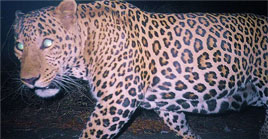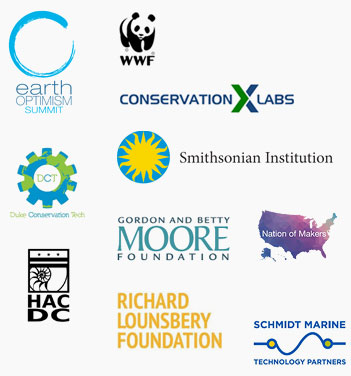
Technology Prizes Con X Tech Prize: Hacking Extinction Closed for entries $20,000 Grand Prize Jan 29-May 4 2020
Bring your idea to life with the Con X Tech Prize!
Conservation X Labs is seeking bold ideas for technology solutions to conservation challenges. Aimed specifically at project teams that are considering their first prototype, the Con X Tech Prize is granting 20 prototyping awards of $3,500 each to take your idea from blueprint to reality.
Funding a working prototype is just the beginning: the twenty grantees will then enter their prototype in the second stage of the grant competition, that features $20,000 in awards. Deadline to enter the first stage is May 4, 2020.
Prize Rounds:
- Round 1: Oceans & Blue Sky [Closed]
- Round 2: Invasive Species & Blue Sky [Closed]
- Round 3: Behavior Change & Blue Sky [Closed]

Technology Challenges Advancing Innovation for Invasive Species Management Open for entries
In the United States, invasive species are a major economic, biosecurity, and environmental threat to natural resources, infrastructure, agricultural production, human health, and wildlife health. The total economic damages of invasive species are estimated at almost $120 billion per year, and a result of increasing international travel and trade.
The large scale complexity of the invasive species issue frequently results in inaction; there is a common belief that, once established, it is no longer logistically or financially feasible to eradicate or control populations of invasive species. Through this series of challenges, we invite the use of open data, new technology applications, and creative solutions to address old and evolving invasives threats. We can do this!

Grand Challenges Ten Grand Challenges for Ocean Conservation Open for entries
The oceans, despite covering most of the planet, are among the least-understood ecosystems on Earth. What data we do have indicate that they have been heavily exploited, and that a significant portion of the planet is dependent on this ecosystem for its wellbeing. The oceans’ fisheries are overtaxed, marine habitats from mangroves to reefs are increasingly degraded, and the basic chemistry and geophysical processes of the oceans are changing, including their pH, temperature, volume, and circulation patterns. This set of challenges is daunting. However, we have an opportunity now to harness our ingenuity to better understand the rates of change underway within ocean systems, to restore degraded ocean environments, and to develop substitutes for products that are threatening the oceans.
While the Ten Grand Challenges for Ocean Conservation are not currently offering prizes nor an active competition, submit your project to a challenge to benefit from the technical support and collaboration from the Tribe and start advancing your project! Additionally, submitted projects may be eligible for funding from a forthcoming Digital Makerspace micro-grants program.
- A Blue Revolution for Oceans: Reengineering Aquaculture for Sustainability
- Ending and Recovering from Marine Debris
- Transparency and Traceability from Sea to Shore: Ending Over-Fishing
- Protecting Critical Ocean Habitats: New Tools for Marine Protection
- Engineering Ecological Resilience in Nearshore and Coastal Areas
- Reducing the Ecological Footprint of Fishing through Smarter Gear
- Arresting the Alien Invasion: Combating Invasive Species
- Combating the Effects of Ocean Acidification
- Ending Marine Wildlife Trafficking
- Reviving Dead Zones: Combating Ocean Deoxygenation, Dead Zones, and Nutrient Runoff

Technology Challenge Camera Trap 3.0 Open for entries
Camera traps - trail or game cameras that fire when an animal is detected - have been used in mainstream ecological research since the late 1990s. Currently available camera trap models are primarily designed for hunters and do not necessarily capitalize on the advances in low-cost/high resolution cameras, computing power, and connectivity. The next generation of camera trap technology will require a low cost, open source instrument that can improve the speed, coverage, and capability of wildlife researchers to harness scientific data for conservation.
While the Camera Trap 3.0 Technology Challenge is not currently offering prizes nor is an active competition, submit your project to the challenge to benefit from the technical support and collaboration from the Tribe and start advancing your project! Additionally, submitted projects may be eligible for funding from a forthcoming Digital Makerspace micro-grants program.

Hackathon Make For The Planet (M4TP) Open for entries Hackathon ended Apr 21-23 2017
On Earth Day weekend of 2017, 16 teams competed to create solutions to challenging conservation problems in front of a global audience at an onsite event called the Make for the Planet as part of the Smithsonian Institution’s Earth Optimism Summit in Washington, D.C. The teams had access to a pop-up makerspace with equipment to create prototypes and models of hardware and/or software solutions to specific conservation problems.
Four teams were selected as finalists and pitched their solutions on the closing plenary stage to a panel of international experts in innovation and conservation and two winners were chosen. More information on the winners and the outcome of the event can be found at:
M4TP Website
Huffington Post Article
While the Make for the Planet competition has ended, the conservation problems have not been solved! Your ideas and project proposals are needed to make a difference in conservation.




